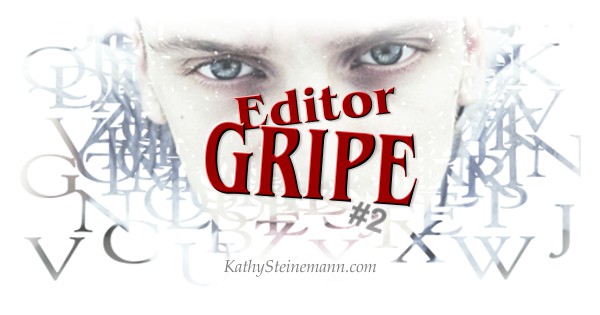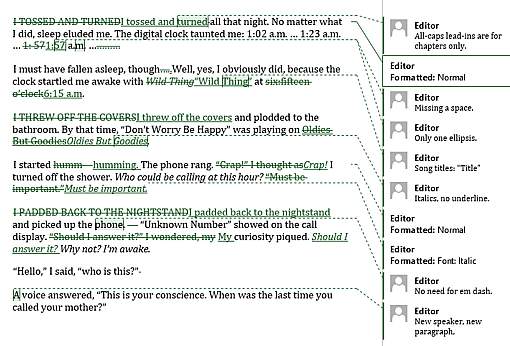
Keep Your Editor Happy
This series of articles discusses writing habits that upset editors.
Here’s article #2. Do you see the problem?
Introduction to Excerpt
The following paragraphs are representative of what I’ve found in many documents I’ve evaluated as an editor, beta reader, and critiquer.
Excerpt
I must have fallen asleep, though….Well, yes, I obviously did, because the clock startled me awake with Wild Thing at six:fifteen o’clock.
I THREW OFF THE COVERS and plodded to the bathroom. By that time, “Don’t Worry Be Happy” was playing on Oldies But Goodies.
“Hello,” I said, “who is this?” A voice answered, “This is your conscience. When was the last time you called your mother?”
Ouch
Formatting is all over the place.
- Some paragraphs begin with all-caps phrases. This typesetting convention doesn’t belong in a manuscript, but may be added for a book’s press run.
-
Three paragraphs are indented, and three are flush-left. The author should pick a style and stick with it.
-
One of the digital times contains an extraneous space between the colon and the minutes. The last digital time is spelled out in an inconsistent format.
-
The first paragraph ends with multiple ellipses. Only one, please.
-
Spacing around ellipses is inconsistent. Authoritative sources recommend that they be surrounded by spaces except when they’re combined with other punctuation, e.g., He laughed … and answered, “But I don’t think I can …” [No space between ellipsis and closing quotation mark.]
-
Em dashes with or without surrounding spaces are correct, but a preference should be established and maintained throughout a manuscript.
-
One song title is in italics, the other is in Roman font enclosed by quotation marks. Songs are generally formatted as per the latter approach, e.g., “Wild Thing.”
-
The name of the radio program is in underlined Roman font. It should be italicized, no underline.
-
Internal monologue switches, from Roman font enclosed in quotation marks, to plain italics. The quote-marks approach confuses readers, because their initial expectation is to see dialogue.
-
The final paragraph combines conversation from both the protagonist and the unknown caller. The rule for dialogue is new speaker = new paragraph. No exceptions, unless you’re including tidbits of unattributed conversation, perhaps from a crowd or in an elevator, consistent with Dr. John Yeoman’s hubbub technique.
The Writer’s Lexicon series
and additional resources on my Facebook page.
Here’s One Solution
I tossed and turned all that night. No matter what I did, sleep eluded me. The digital clock taunted me: 1:02 a.m. … 1:23 a.m. … 1: 57 a.m. …
I must have fallen asleep, though. Well, yes, I obviously did, because the clock startled me awake with “Wild Thing” at 6:15 a.m.
I threw off the covers and plodded to the bathroom. By that time, “Don’t Worry Be Happy” was playing on Oldies But Goodies.
I started humming. The phone rang. Crap! I turned off the shower. Who could be calling at this hour? Must be important.
I padded back to the nightstand and picked up the phone. “Unknown Number” showed on the call display. My curiosity was piqued. Should I answer it? Why not? I’m awake.
“Hello,” I said, “who is this?”
A voice answered, “This is your conscience. When was the last time you called your mother?”
Notes
Now that all the formatting inconsistencies have been removed, flaws in the narrative are more obvious:
- The writer starts almost every paragraph with I.
-
There’s a conspicuous over-reliance on internal monologue.
-
The three sentences following My curiosity was piqued could be removed without affecting the flow.
-
Did you miss the deleted em dashes? They couldn’t have been that important, right?
Other changes could further improve the excerpt.
Who is the unknown caller? Story prompt?
Takeaway
Flaws in writing can be obscured by haphazard formatting. Clean up your copy to the best of your ability. Reread and revise until you think it’s perfect. Then read it out loud at least once.
Rinse and repeat.
P.S.
Indented paragraphs function well for novels, whether fiction or nonfiction. But never use tabs or multiple spaces to indent them.
Block-formatted paragraphs excel for nonfiction works like cookbooks and instruction manuals, where entries such as bulleted lists are often required.
Whether your editor charges by the word, page, or hour, your relationship will run smoother if you submit clean copy. Imagine the clutter in the above excerpt after an editor has worked on it. See the MS-Word screen print below if you don’t believe me.

The Writer’s Lexicon series
and additional resources on my Facebook page.
Discover more from KathySteinemann.com: Free Resources for Writers
Subscribe to get the latest posts sent to your email.

Speaking as an editor, I advise any prospective client to do some editing themselves before sending me anything. Even if it’s just running Word’s spelling and grammar check. Athough it can’t solely be relied upon, at least it suggests cleaning some of the mess up!
Thanks, Em. As you pointed out, Word’s spelling and grammar check isn’t perfect, but it’s better than nothing. Too many writers expect miracles from their editors.